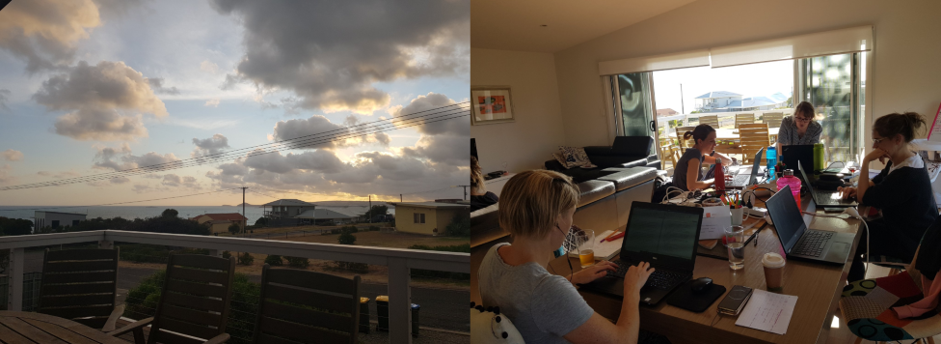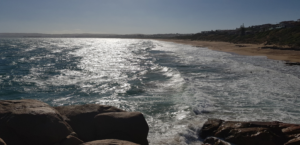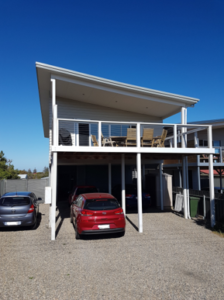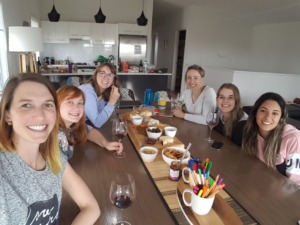
By Jessica Young, Jennifer Baldock, Brittany Johnson, Chelsea Mauch, Georgia Middleton & Shabnam Kashef
Introduction
Do you find yourself getting easily distracted the second you sit down to write? Do you struggle to find dedicated time to write due to the competing demands of emails that need to be attended to, cleaning that needs to be done, pets that need to be patted?
A writing retreat may be just what you need! Writing retreats are structured writing events where a group of individuals take themselves out of their usual environment and away from their usual distractions to complete a writing task. During this time, participants can share their aims, progress and difficulties in a supportive environment of peers while working towards a predetermined writing goal (Papen & Thériault, 2018; The Thesis Whisperer, 2013).
There are many documented benefits to participating in writing retreats. Studies have shown that participating in writing retreats can increase an academic’s motivation to write while also increasing productivity and reducing feelings of underachievement (Dickson-Swift et al., 2009; Grant, 2006; MacLeod, Steckley & Murray, 2012). Writing retreats have been shown to increase feelings of social connectedness in academics (Grant, 2006) and in PhD students (Papen & Thériault, 2018).
In this blog post, we reflect on a recent shared experience of a summer writing retreat, with the aim of developing some key recommendations for others wanting to maximise their writing productivity by hosting or attending a writing retreat of their own.
Method
From the 5th-8th of January 2020, six PhD students from Flinders University College of Nursing and Health Sciences participated in a three-day writing retreat, in the coastal town of Pt Elliot, South Australia (see image 1).

Recruitment
In early October 2019, the retreat organiser (JY) sent an email to PhD students within her personal network to seek expressions of interest for a writing retreat. Once it was established that there were a small number of enthusiastic students keen to participate, JY found a date that worked for the majority of participants, scoped potential accommodation and encouraged attendees to invite students and ECRs within their broader networks. All correspondence was done via email, until the days immediately before where one participant created a Facebook messenger chat group.
Dietary requirements
Once the dietary requirements of all attendees had been established, JY allocated two attendees per each shared meal. Shared meals comprised of mostly ‘build-it-yourself’ options such as Vietnamese noodle bowls, burritos and falafel/chicken wraps. Each person brought their own snacks, breakfast and drinks.
Accommodation
The accommodation cost just under $300 per person, for 3 nights. We stayed at a large (4-bedroom, 3-bathroom) beach house with a balcony, a view of the beach, full kitchen, WIFI, a giant dining room table, comfy couches and outdoor setting (see Image 2).

Writing plans
Each participant was advised to prepare a writing plan in advance of the retreat. After arrival on the first night, everyone participated in a planning session over wine and cheese (see image 3) to map out their goals, decide on writing time/breaks and break up their goals into achievable steps. These were then written on a whiteboard, which was visible to all participants throughout each day. When items were completed, the group celebrated the ‘ticking off’ with compliments and cheers!

Writing sessions
Our writing sessions were a combination of golden hours where we worked solidly for the first 1.5hrs in the morning, more golden hours or ‘pomodoros’ (Cirillo, 2019). The pomodoro technique was great for afternoon sessions where you write solidly for 25 mins then a 5-min stretch break, then repeat. On average we had around 6-7 hours of writing on the two writing days.
Breaks
With close proximity to the ocean, some of our breaks consisted of walks along the beautiful beaches and patting dogs, until the smoke from the fires encroached on our views. Some participants chose to nap during breaks, read books, build sandcastles, go for runs or phone home. No constraints were placed on how participants spent this time, yet participants often chose to spend this time together.
Results
All six participants used the writing retreat to achieve individualised goals. Each participant shared the tangible result/s of their participation in the retreat:
- Jennifer Baldock completed a full draft of an article to be submitted to Psychophysiology in the coming months.
- Brittany Johnson wrote two draft articles: one prepared from a thesis chapter and one heavily edited from a rough draft. Both are now ready to circulate to coauthors.
- Jessica Young spent the time ‘freewriting’ on 2 topics: her personal perspectives/biases/influences and on her interactions with the families who participated in her research.
- Georgia Middleton spent the majority of her time at the writing retreat constructing a rough draft of the results for her first study, drafting some discussion points for the same chapter, and getting in some solid reading time.
- Chelsea Mauch used the writing retreat to define her thesis narrative and write an overall thesis outline. Much to her surprise, she achieved this initial goal on day one, so spent day two reading and writing a section of her thesis introduction.
- Shabnam Kashef used this time to complete a final draft of her ethics application, ready for thorough supervisor feedback
In addition, each participant shared a short reflection on their time spent at the retreat. Jennifer Baldock spoke of the timeliness of the event, at the beginning of the year, in relation to the motivation that came from her engagement in the retreat:
“This writing retreat was such a fun and productive way to get back into my PhD work after the Christmas and New Year period. I have often found myself struggling with motivation at this time of year but having the support of the other attendees in such a wonderful environment made it relaxing and quite easy to switch back on. Additionally, another huge benefit of this retreat was enhancing my connections with other PhD students. I had so much fun with the other students and I am grateful to have this support network going forward. I achieved my goals and felt like I had a holiday with friends at the same time.”
Chelsea Mauch also found the timing of the event ideal for creating momentum in the lead up to the start of a new academic year:
“This writing retreat was timed beautifully for me, providing the inspirational environment and people I needed to define my thesis narrative. At the end of 2019, I had completed the draft chapters detailing the three studies making up my PhD project. So I used day one to reflect on my work to this point and write a thesis outline or narrative to guide my thesis writing over the next few months. The encouragement and positivity of my peers, and the focus afforded to me by the serene surrounds, enabled me to achieve this goal on what could have been one of the toughest days of the year. Along with the bonus of writing a section of my thesis introduction on the second day, this writing retreat was the perfect way to kick off the year and left me feeling like my thesis submission goal of mid-year is more achievable than ever.”
Brittany Johnson spoke predominantly of the power of being in a supportive environment, designed with intent to motivate and increase writing productivity:
“The buzz of typing keyboards and concentration really helps you to keep motivated and power through the writing blocks. I think because we had financially invested in the retreat and knowing that everyone was keen to knuckle down helped to make it such a productive few days when there was the temptation of just spending the day down the beach. Jess had come prepared with a whiteboard and lots of fun coloured pens and highlighters that got us going in our planning session. We have a visual reminder of our goals for each writing block on the whiteboard to keep focussed. We had the perfect balance of good food, views and company (including a fun night playing board games to unwind after the first writing day) with the productive writing time to come away feeling as though I’d had a holiday as well.”
Shabnam Kashef shared her perspectives both on the perfect timing of the retreat and of the momentum created by completing tasks early in the year:
“I found that a writing retreat was a great way to transition into the New Year. Seeing everyone around me so focussed on their task made me eager to keep up and tick off my goals, plus it paid off! To have something complete, in my case it was an ethics application, so early in the year was a great motivator to kick off 2020. Not to mention the delicious food, wonderful company and beautiful sights of Port Elliot made it all worth the venture.”
Georgia Middleton spoke of initial uncertainty and a lack of motivation, which had to be overcome:
“I was very unprepared and somewhat unmotivated coming into this retreat. After a hectic holiday break I was not feeling the relaxed and rejuvenated human I was hoping to be, but was instead already overtired and stressed out. Coming to the retreat, sitting down with the other students, taking the time to talk through and set specific goals was exactly what I needed to get my head into gear. The structure and my lovely, positive and motivated peers were a great encouragement to start off 2020 in the right headspace. Debriefs, beach walks, hang times, delicious food and wine were the icing on the cake, making this whole experience productive, fun and energising! I personally can’t wait for another.”
Aligning with Georgia’s perspective, Jessica Young shared that she too had initially “felt unprepared for the retreat”. She went on to describe how the support of her peers was invaluable for overcoming this feeling:
“I had a vague idea of what I needed to write next, but nothing concrete. I found the planning session to be hugely beneficial and was able to clearly define ‘next steps’ through conversation with other students. Keeping each other accountable during dedicated writing sessions and then debriefing during break times made for an incredibly productive and enjoyable 2 days of work. Sharing meal preparation and tea-making duties meant that we each could spend more dedicated time writing while still getting the fuel we needed to keep going. Coming out of the retreat, I feel reinvigorated and enthusiastic about my impending journey to PhD completion.”
Discussion
Taken together, these reflections clearly show that:
1.The basic format of a writing retreats (coming together as a group, goal-setting and uninterrupted writing time) can be tailored to meet the needs of students at all stages of their candidature:
- We have shown that writing-based outcomes of participation can vary widely
- Participants felt that preparation and planning was an essential step to a productive writing retreat
- Accountability to goal setting can be facilitated by a visual schedule of each person’s goals, and updated as needed
2. A writing retreat may be more beneficial at ‘critical moments’ in the candidature (i.e., Confirmation of candidature, ethics, or thesis write up) or to build/maintain momentum at key ‘lull’ times of the year (e.g., start of the new year, or perhaps in the middle of winter, in the school holidays)
3. The major benefit of our writing retreat was the social aspect:
- Working alongside peers helped with accountability, encouragement, positivity and motivation
- Being able to establish goals through conversation with other students, and debrief during breaks helped participants work through writing blocks
- Participation in the retreat strengthened the peer/mentor network, important for the future
4. A balance of work and ‘holiday’ activities was essential:
- Creating a comfortable, supportive environment facilitated the achievement of this balance
- Good food and drinks, beach walks, serene surrounds, times for rest and board games balanced the focused writing time
Future considerations:
The accommodation was lovely, but was on the upper end of the initial budget. Although not all retreats necessarily need to cost the participants money, some participants felt that the financial investment in this retreat (i.e., accommodation and catering costs) was an extra motivator for writing productivity. A less fancy house may have been adequate, but it was a treat to have so much space to spread out, comfy beds and a stunning view.
A similar group have previously held single-day retreats within Flinders campus. To those considering organising their own retreat, day ‘trips’ to unfamiliar parts of the campus, (e.g., to Sturt or Tonsley) can serve a similar function and require considerably less organisation. Borrowing from the principles above, perhaps these retreats could incorporate some social aspect and/or shared meals, beanbags or casual clothes (e.g., Hawaiian shirts) to create a relaxed, ‘holiday’ vibe.
Conclusion
By all accounts, the writing retreat was a great success. All participants found it was socially rewarding, personally rejuvenating and, ultimately, increased their writing productivity. All participants managed to achieve a lot in their first few days back to PhD studies in 2020.
For any students interested in participating in upcoming writing retreats and/or seeking further advice about hosting their own retreat please don’t hesitate to contact jess.young@flinders.edu.au.
Happy writing!
References
Cirillo, F. (2019). The Pomodoro Technique: Do more and have fun with time management. https://francescocirillo.com/pages/pomodoro-technique
Dickson-Swift, V., James, E. L., Kippen, S., Talbot, L., Verriner, G., & Ward, B. (2009). A non-residential alternative to off campus writers’ retreats for academics. Journal of Further and Higher Education, 33(3), 229–239.
Grant, B. M. (2006). Writing in the company of other women: Exceeding the boundaries. Studies in Higher Education, 31(4), 483–495.
MacLeod, I., Steckley, L., & Murray, R. (2012). Time is not enough: Promoting strategic engagement with writing for publication. Studies in Higher Education, 37(6), 641–654.
Papen, U., & Thériault, V. (2018). Writing retreats as a milestone in the development of PhD students’ sense of self as academic writer. Studies in Continuing Education, 40(2), 166-180.
The Thesis Whisperer. (2013). Why you should create your own thesis writing retreat (or reasons to travel). https://thesiswhisperer.com/2013/02/20/why-you-should-create-your-own-thesis-writing-retreat-or-reasons-to-travel/

